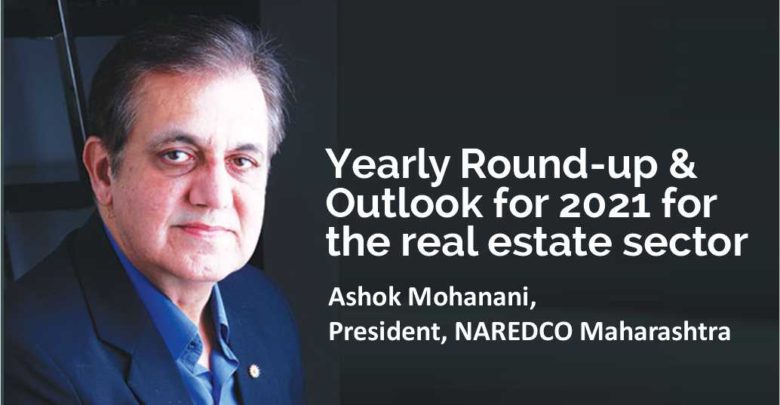Yearly Round-up & Outlook for 2021 for the real estate sector
Ashok Mohanani, President, NAREDCO Maharashtra

With the World Health Organisation (WHO) declaring it a global health emergency and pandemic on March 11, 2020, due to COVID-19, the sentiments of businesses worldwide were severely impacted and were mostly negative in their outlooks. The outbreak created a great deal of uncertainty regarding trade and imports across the globe.
The real estate sector, too, touched the lowest of lows during the almost three-month-long nationwide lockdown. While construction activities came to a sudden halt, reverse migration of labourers made the resumption of work difficult. Developers faced severe liquidity constraints and homebuyers lost a significant appetite to buy a property. Home sales and new property launches suffered a great deal as the nation struggled to battle the pandemic.
Government and apex bodies came up with plenty of fiscal measures to deal with the major challenge of liquidity funding. The various measures introduced by the RBI and Union finance minister injected liquidity into the market so that the economy can recuperate quickly. The Central Government and the various State governments would do well to stop further proliferation of the virus and handhold the Indian real estate sector in the times of crisis.
Six months into the situation, real estate demand has piqued with genuine homebuyers willing to take advantage of value propositions coupled with payment plans given by a vast set of developers. Development work across construction sites, too, has begun, although at a slower pace.
As there is a major shift towards digitization due to the pandemic; people who favour offline property search now prefer online real estate portals to search their dream homes. Online home sales have begun to gain traction and leading developers with good track record will be the main beneficiaries of this change. There has also been a huge demand for virtual tours wherein home-buyers are opting the same either to shortlist or to finalise their homes. In a significant trend seen during Covid-19, unlike before many respondents seeking property from investment perspective prefer ready-to-move-in (RTMI) homes. The consumer preference has predominantly shifted towards affordable and mid-segment properties.
There are several initiatives taken up to support the real estate sector by the Maharashtra Government which has already spurred demand and revived confidence in the industry. Also, the unanimous decision by NAREDCO Maharashtra to waive stamp duty completely on the sales of residential properties has added to the home buying euphoria and supported the Government’s efforts to push housing demand in the state. It has not only pushed stagnant housing sales northwards but also made home buying cheaper and supported the State exchequer mop up a whooping stamp duty in revenues in just two months. Such initiatives should be emulated by other state governments as it will be a good booster for realty at Pan India level.
Knight Frank India, leading international property consultancy estimates that home sales volume in Mumbai recorded at 9,301 units in November 2020 registering a whopping 67% year-on-year (YoY) rise over the same month last year boosted by stamp duty cut and festive period of Diwali. This strong growth of 17% month-on-month (MoM) in November 2020 comes after a robust 42% MoM growth during October 2020 and massive 112% MoM growth during September 2020, when sales of residential property started to show an upward trend after months of COVID-19 induced slowdown.
Mumbai has witnessed a cumulative residential sale of 22,827 units after the stamp duty cut during September-November 2020. The monthly run rate in this period after the stamp duty cut is approximately 135% or 1.35 times the monthly average of 2019.
With steady decline in the number of COVID-19 infections across the country and the vaccine around the corner, we expect better days for the economy going forward along with the GDP growth to turn positive in Q4 this financial year The Repo rate cuts, lower home loan interest rates and newly announced affordable rental housing policy open new avenues for the segment.
The industry players anticipate the upcoming Budget for Financial Year (FY) 2020-21 to relax income tax norms, offer single-window clearance and GST reforms. The helpful measures like easing out of the liquidity issues that are being faced by the sector can aid the buyers to make investments, thus lending a positive push to the vision of ‘Housing-For-All’.
Our Real Estate fraternity is hopeful that with the full support from the Government, we will be able to implement much needed measures to boost the real estate sector in 2021 and further. Every calamity is an opportunity to scale new heights. Indian real estate and allied manufacturing industries must find positivity in the current recovering scenario of the economy and should try to benefit by increasing local production and indigenous innovation.


